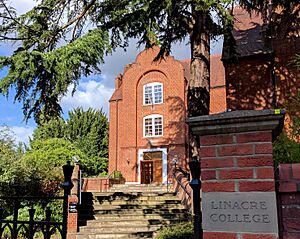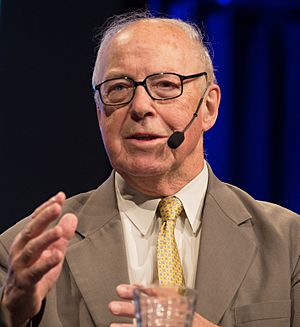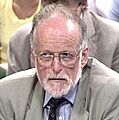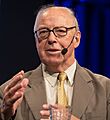David Kelly (weapons expert) facts for kids
Quick facts for kids
David Kelly
|
|
|---|---|
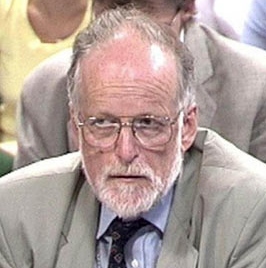
Kelly during a Foreign Affairs Select Committee meeting on 15 July 2003, two days before his death
|
|
| Born |
David Christopher Kelly
14 May 1944 Llwynypia, Glamorgan, Wales
|
| Died | 17 July 2003 (aged 59) Oxfordshire, England
|
| Body discovered | Harrowdown Hill, Longworth, Oxfordshire |
| Education | |
| Occupation |
|
| Employer | Ministry of Defence |
David Christopher Kelly (14 May 1944 – 17 July 2003) was a very important Welsh scientist. He was an expert in biological warfare, which means studying how to protect against or deal with diseases used as weapons. Dr. Kelly used to lead the Defence Microbiology Division at Porton Down, a famous science facility in the UK.
In the early 1990s, he was part of a team from the US and UK. They visited science places in Russia and found out that Russia had a secret and illegal program for biological weapons. Later, in 1991, he became a chief weapons inspector for the United Nations Special Commission (UNSCOM) in Iraq. He led many missions there until 1998. He also worked with a new UN group called the United Nations Monitoring, Verification and Inspection Commission (UNMOVIC). Dr. Kelly was key in finding secret anthrax production at the Salman Pak facility and another biological weapons program at Al Hakum in Iraq.
In 2002, the British government published a report about Iraq's weapons of mass destruction. This report said some of Iraq's chemical and biological weapons could be used within 45 minutes. About a year later, Dr. Kelly had a private chat with a BBC journalist, Andrew Gilligan, about this claim. When Gilligan reported it, he said the "45 minutes" claim was added because a government official, Alastair Campbell, insisted on it. Dr. Kelly later said he didn't tell Gilligan that Campbell forced the reference.
The government complained to the BBC, and a big argument started between them. Dr. Kelly told his managers at the Ministry of Defence that he might have been the source, but he didn't think he was the only one. Soon, his name became known to the public and the media. On 15 July 2003, he had to speak to two important groups of politicians. Two days later, Dr. Kelly was found dead near his home.
Dr. Kelly received an award called the Companion of the Order of St Michael and St George (CMG) in 1994 for his important work. He was even nominated for the Nobel Peace Prize because of his efforts in Iraq.
Contents
David Kelly's Early Life and Education
Growing Up in Wales: 1944–1984
David Christopher Kelly was born in Llwynypia, a town in South Wales, on 14 May 1944. His parents were Thomas John Kelly and Margaret. His father was a schoolteacher who served in the Royal Air Force during Second World War. David's parents divorced in 1951. His mother then moved with young David to live with her parents in Pontypridd.
When he was eleven, David went to the local grammar school. He was very good at sports and music. He even played the double bass in the National Youth Orchestra of Wales and was a skilled saxophone player. He also represented Wales in youth cross-country running.
In 1963, David Kelly started studying chemistry, botany, and biophysics at the University of Leeds. His mother passed away two years later. In 1967, he earned his first degree in bacteriology. After that, he got a master's degree in virology from the University of Birmingham. On 15 July 1967, between his two degrees, he married Janice.
In 1968, Dr. Kelly joined the Insect Pathology Unit at the University of Oxford. He was a student at Linacre College, Oxford at the time. In 1971, he earned his doctorate degree in microbiology. His special research was about how certain viruses copy themselves in cells. In the early 1970s, he did more research at the University of Warwick. Then, in the mid-1970s, he returned to Oxford. He worked at the Institute of Virology and Environmental Microbiology, studying viruses that affect insects. He became a Chief Scientific Officer, focusing mostly on insect viruses.
Dr. Kelly's Work as a Weapons Inspector
Working at Porton Down and in Russia: 1984–2003
In 1984, Dr. Kelly started working for the Ministry of Defence (MoD). He became the head of the Defence Microbiology Division at Porton Down, a research facility in Wiltshire. When he arrived, his department had only a few microbiologists. Most of their work was about cleaning up Gruinard Island. This island had been used during the Second World War for experiments with anthrax as a weapon.
Dr. Kelly made his department bigger and got more money for research into biodefence. Because of his and his team's work, the UK was able to use biodefence during the 1990–1991 Gulf War.
Inspecting Russia's Programs: 1991–1994
In 1989, a top Soviet biologist named Vladimir Pasechnik moved to the UK. He shared secret information about a hidden Soviet program for biological weapons. This program went against the 1972 Biological Weapons Convention, which banned making chemical and biological weapons. Dr. Kelly helped process this information for three years.
From 1991 to 1994, Dr. Kelly visited Russia several times. He co-led a team from the UK and US that inspected civilian biotechnology facilities there. They could only visit non-military places. The Russians often made it difficult for the team to inspect key areas and sometimes lied about what parts of the facilities were used for.
During one visit, Dr. Kelly talked to a lab assistant who was not supposed to know much. Dr. Kelly asked him about his work, and the assistant surprisingly said he was testing smallpox. Dr. Kelly then questioned the head of the facility about smallpox, but got no answers. Dr. Kelly called these questioning sessions "a very tense moment."
In a report, Dr. Kelly wrote that the visits were not easy. He said that at one facility, they were not allowed to see important research areas. At another, officials lied about smallpox research. He also mentioned that at a third facility, dangerous test chambers were described as being for farming projects. He concluded that the Russians did not give honest accounts of their activities.
Two official reports from these visits confirmed that the Soviets had a secret and illegal biological weapons program. Dr. Kelly believed that the inspection program had failed because Russia refused to fully explain its past and current biological weapons activities. Also, the American-British teams could not get into military facilities.
Working in Iraq: 1991 – May 2003
After the Gulf War, the United Nations Security Council Resolution 687 required Iraq to destroy all its chemical and biological weapons under international supervision. The United Nations Special Commission (UNSCOM) was created for this purpose. In 1991, Dr. Kelly was appointed as one of its chief weapons inspectors in Iraq.
Iraq gave UNSCOM a list of sites related to weapons of mass destruction (WMD). In August 1991, Dr. Kelly led the first group of UN biological weapons investigators into Iraq. He told reporters they would visit sites that looked like they had biological activity. The first UNSCOM missions did not find clear evidence of an Iraqi biological or chemical program. However, they did confirm that some sites the US thought were involved in biological warfare were actually normal places like a bakery or a dairy.
UNSCOM carried out 261 inspection missions in Iraq between 1991 and 1998. Dr. Kelly led ten of the missions focused on biological weapons. In 1998, Iraq refused to work with UNSCOM. Iraq's leader, Saddam Hussein, even specifically named Dr. Kelly for expulsion from the country.
During an inspection in 1998, Dr. Kelly met an American translator who introduced him to the Baháʼí Faith. Dr. Kelly became a member of this faith and remained so for the rest of his life. He loved Iraq, its people, and its culture, but he strongly disliked Saddam's government.
Finding Iraq's Weapons Programs
In 2000, UNSCOM was replaced by the United Nations Monitoring, Verification and Inspection Commission (UNMOVIC). Its goal was similar: to remove Iraq's WMDs and make sure Iraq didn't get them again.
Dr. Kelly returned to work as a government advisor on biological warfare for the MoD. But he also continued to work with UNMOVIC and visit Iraq. He was part of at least 36 missions to Iraq. Even though the Iraqis tried to stop them, Dr. Kelly was crucial in finding Iraq's biological weapons facilities. He helped uncover the anthrax production program at the Salman Pak facility and another biological weapons program at Al Hakum.
In 2002, George W. Bush, the President of the United States, talked about Iraq's use of WMD. Later that year, he said the US policy was to change Iraq's government. As part of the British government's reasons for war against Saddam, Tony Blair, the British Prime Minister, ordered a report on Iraqi WMD to be published on 24 September 2002.
This report, based on intelligence, stated that Iraq had:
- continued to make chemical and biological agents.
- military plans to use chemical and biological weapons, including against its own people. Some of these weapons could be used within 45 minutes of an order.
- ways to control and use chemical and biological weapons, with Saddam Hussein having the final say.
Before the report was published, Dr. Kelly saw a draft copy and attended a meeting to review it. He made twelve comments on the information in the report. None of his comments mentioned the "45-minute" claim.
On 8 November 2002, the UN Security Council passed a resolution. It gave Iraq a final chance to follow its disarmament rules. As a result, UN inspectors were allowed back into Iraq and given information about Iraq's WMD program. Dr. Kelly believed that even with these steps, Saddam still refused to admit how much chemical and biological weapons he had. There was still concern about a large amount of anthrax, other agents, and bombs that were missing from activities up to 1991.
David Kelly's Death

Dr. David Kelly died on 17 July 2003. His body was found the next day, 18 July, near his home.
David Kelly's Legacy
Dr. Kelly's death and the events leading up to it have inspired many artists. These include the 2006 song "Harrowdown Hill" by Thom Yorke, a 2008 painting called Death of David Kelly, and the 2015 novel Number 11 by Jonathan Coe. There is also a poem about him.
His story has also been told in plays and documentaries. A 2005 TV drama called The Government Inspector starred Mark Rylance as Dr. Kelly. There was also a radio play about the inquiry into his death. His final moments are even part of a stage play called Palace of the End.
In 1996, Dr. Kelly received the award of Companion of the Order of St Michael and St George (CMG). The award recognized his scientific work in biological warfare defence. It also highlighted his tireless efforts in Iraq and the former Soviet Union. He worked with good humor despite facing difficulties, hostility, and personal risk. The award noted that his work had a big impact internationally.
Lord Hutton, who led the inquiry into Dr. Kelly's death, suggested that Dr. Kelly might have been considered for a knighthood in May 2003. His important work in Iraq led to his nomination for the Nobel Peace Prize. His biographer, Norman Baker, wrote that Dr. Kelly probably did more to make the world safer than anyone else between 1990 and his death. He was seen as an "inspectors' inspector" among other international weapons experts.
Images for kids


